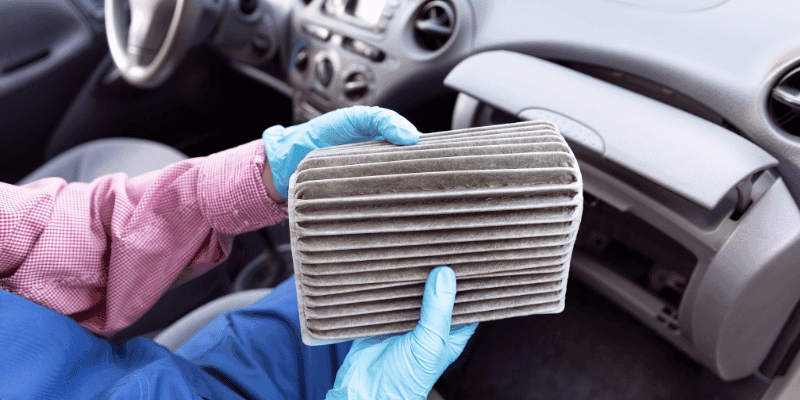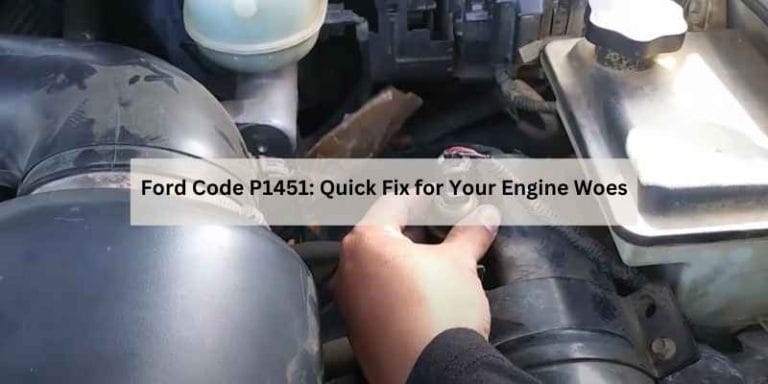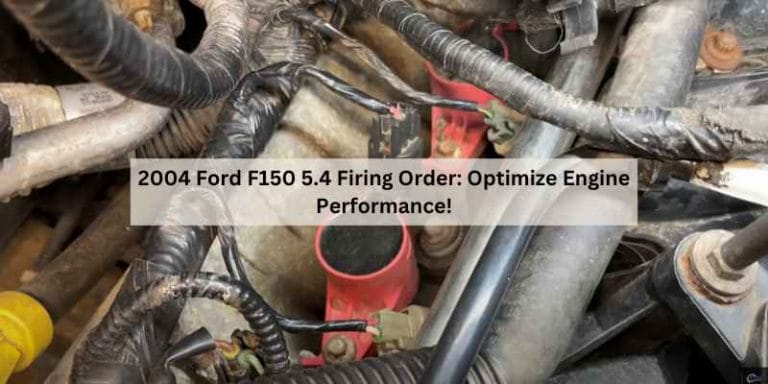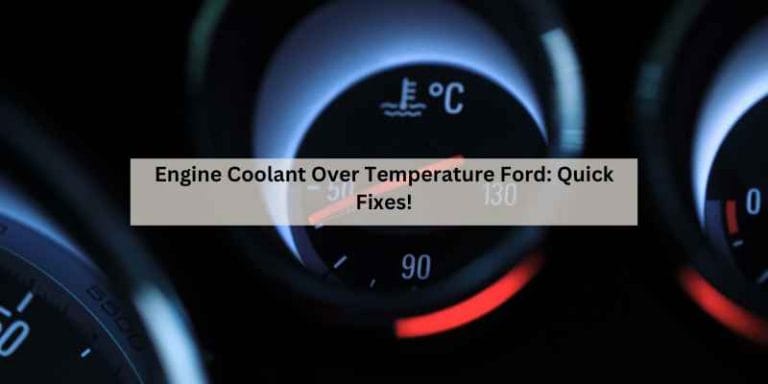Does a 2013 Ford F150 Have a Cabin Air Filter: Unveiling the Hidden Comfort Enhancer
Yes, a 2013 Ford F150 does have a cabin air filter. The cabin air filter in a 2013 Ford F150 helps to improve the air quality inside the vehicle by filtering out dust, pollen, and other particles from entering the cabin.
This filter is responsible for trapping contaminants and preventing them from circulating in the air you breathe while driving. Regularly replacing the cabin air filter is recommended to maintain clean and fresh air in the cabin and to ensure the efficient operation of the vehicle’s HVAC system.
By following the manufacturer’s guidelines, you can easily replace the cabin air filter in your 2013 Ford F150 and enjoy a healthier and more comfortable driving experience.
Understanding The Role Of Cabin Air Filters In Enhancing Comfort
Enhance your comfort level with a clear understanding of the role of cabin air filters in a 2013 Ford F150. These filters improve air quality by trapping dust, pollen, and other pollutants, making your driving experience more enjoyable and healthier.
Having a clean and fresh environment inside your vehicle is essential for a comfortable and pleasant driving experience. One key component that contributes to this is the cabin air filter. Let’s delve deeper into the purpose of these filters and how they improve air quality inside your vehicle, ultimately enhancing passenger comfort and health.
The Purpose Of Cabin Air Filters In Vehicles:
- Trap contaminants: Cabin air filters are designed to trap and filter out various airborne pollutants, preventing them from entering the vehicle’s cabin. These contaminants include dust, pollen, smog, exhaust fumes, and even bacteria and mold spores. By capturing these particles, cabin air filters help maintain a clean and healthy atmosphere inside the vehicle.
- Protect HVAC system: In addition to improving indoor air quality, cabin air filters also play a crucial role in protecting the HVAC (Heating, Ventilation, and Air Conditioning) system of your vehicle. They prevent dust and debris from clogging the system, thus ensuring its efficient operation and longevity.
- Enhance air circulation: Another important function of cabin air filters is to enhance the ventilation and air circulation within the cabin. By allowing clean and filtered air to flow freely, these filters contribute to a more comfortable and refreshing environment for both the driver and passengers.
How Cabin Air Filters Improve Air Quality Inside The Vehicle:
- Removal of allergens: Cabin air filters effectively remove allergens such as pollen and dust from the air, reducing the risk of allergic reactions and respiratory issues for individuals with allergies or asthma. This feature is especially beneficial during springtime or in areas with high pollen levels.
- Filtration of harmful particles: The filters are capable of capturing and filtering out harmful particles such as soot, smoke, and exhaust fumes. This helps prevent them from entering the cabin and being inhaled by the occupants, thus protecting their respiratory health.
- Odor elimination: Cabin air filters also aid in eliminating unpleasant odors that may enter the vehicle through the ventilation system, such as those caused by pollution, smoke, or nearby industrial areas. By removing these odorous particles, the filters contribute to a more enjoyable and odor-free atmosphere inside the vehicle.
The Impact Of Clean Air On Passenger Comfort And Health:
- Fresh and pleasant environment: By removing airborne particles and odors, cabin air filters significantly contribute to a fresh and pleasant environment inside the vehicle. This enhances passenger comfort and makes driving more enjoyable, particularly during long journeys.
- Improved respiratory health: Breathing in clean air can have a positive impact on respiratory health. Cabin air filters play a crucial role in reducing the risk of allergies, asthma, and other respiratory issues by filtering out harmful particles and allergens. This is particularly important for individuals who spend a significant amount of time inside their vehicles.
- Enhanced focus and alertness: Poor air quality can lead to drowsiness, reduced focus, and fatigue while driving. By keeping the air inside the vehicle clean and fresh, cabin air filters help maintain the driver’s alertness and focus, ensuring a safer and more comfortable journey for everyone on board.
Cabin air filters are an integral part of a vehicle’s ventilation system. They not only improve air quality by trapping and filtering out various pollutants, but they also contribute to passenger comfort, respiratory health, and a more enjoyable driving experience.
Regularly replacing and maintaining these filters is essential to maximize their effectiveness and ensure a healthy and refreshing environment inside your vehicle.

Credit: issuu.com
Determining If A 2013 Ford F150 Has A Cabin Air Filter
The 2013 Ford F150 may or may not have a cabin air filter. To determine if your specific vehicle has one, consult the owner’s manual or check with a Ford dealership. Regular maintenance of the cabin air filter helps improve air quality within the vehicle.
Does A 2013 Ford F150 Have A Cabin Air Filter?
If you are a proud owner of a 2013 Ford F150, you may be wondering if your vehicle is equipped with a cabin air filter. A cabin air filter plays a crucial role in maintaining the air quality inside your vehicle by filtering out pollutants and allergens.
In this section, we will guide you on how to determine if your 2013 Ford F150 has a cabin air filter, as well as identify its location and the specific model variants that come with this feature.
How To Check If Your 2013 Ford F150 Has A Cabin Air Filter:
Determining whether your 2013 Ford F150 is equipped with a cabin air filter is a relatively simple process. Follow these steps to find out:
- Open the hood of your vehicle and locate the cabin air filter housing
- The cabin air filter housing is typically located in the engine bay, on the passenger side, near the cowl area
- If your F150 has a cabin air filter, you will see a rectangular housing with a removable panel or cover
Identifying The Location Of The Cabin Air Filter In The Vehicle:
Once you have determined that your 2013 Ford F150 has a cabin air filter, it is essential to know its precise location to carry out periodic maintenance. Here are the typical locations where you can find the cabin air filter in your vehicle:
- Behind the glove compartment: After removing the glove compartment, you may find the cabin air filter housing positioned towards the back
- Beneath the cowl: In some F150 models, the cabin air filter can be accessed by removing the plastic panel beneath the windshield wipers
Remember to consult your owner’s manual for the exact location and instructions on how to access and replace the cabin air filter in your specific model variant.
The Specific Model Variants Of The 2013 Ford F150 That Come With Cabin Air Filters:
Although the presence of a cabin air filter can vary depending on the specific trim level and model variant of the 2013 Ford F150, the following variants are known to come equipped with a cabin air filter:
- Ford F150 XLT
- Ford F150 Lariat
- Ford F150 King Ranch
- Ford F150 Platinum
- Ford F150 Limited
It is worth noting that not all trim levels or model variants of the 2013 Ford F150 include a cabin air filter. Therefore, it is crucial to check your particular vehicle’s specifications to verify if it is equipped with this feature.
Determining if your 2013 Ford F150 has a cabin air filter requires a quick inspection under the hood. Once confirmed, you can locate the filter within the vehicle and identify the specific model variants that come equipped with this essential feature.
Regularly replacing the cabin air filter will help ensure clean and fresh air inside your truck’s cabin, contributing to a healthier and more comfortable driving experience.
Steps To Replace The Cabin Air Filter In A 2013 Ford F150
Yes, a 2013 Ford F150 does have a cabin air filter. To replace it, follow these simple steps.
If you own a 2013 Ford F150 and are wondering if it has a cabin air filter, the answer is yes! A cabin air filter plays a crucial role in ensuring the air inside your vehicle is clean and free from dust, pollutants, and allergens.
Over time, the filter can become dirty and clogged, compromising its effectiveness. Scheduling regular replacement of the cabin air filter is important to maintain a healthy and comfortable cabin environment. In this section, we will guide you through the step-by-step process of replacing the cabin air filter in your 2013 Ford F150.
Tools And Materials Required For The Replacement Process:
To replace the cabin air filter in your 2013 Ford F150, you will need the following tools and materials:
- A screwdriver or other suitable tool for removing the cabin air filter cover
- New cabin air filter (make sure it is compatible with your vehicle)
- Clean cloth or rag to clean the surrounding area (optional)
Accessing The Cabin Air Filter Compartment In The Vehicle:
Before beginning the replacement process, you need to locate the cabin air filter compartment in your 2013 Ford F150. Here are the steps to access the cabin air filter compartment:
- Locate the cabin air filter cover: The cabin air filter compartment is usually located behind the glove box or under the dashboard on the passenger side. Check your vehicle’s manual or do a quick online search for the specific location in your 2013 Ford F150.
- Open the glove box: Open the glove box and remove any items stored inside. Look for tabs or screws on the sides or bottom of the glove box that secure it in place. Release the tabs or unscrew the screws to lower the glove box, providing access to the cabin air filter compartment.
Step-By-Step Instructions For Removing And Installing A New Cabin Air Filter:
Once you have accessed the cabin air filter compartment in your 2013 Ford F150, you can proceed with removing and installing a new cabin air filter. Follow these step-by-step instructions:
- Remove the cabin air filter cover: Locate the cabin air filter cover within the compartment. Use a screwdriver or the appropriate tool to remove any screws or clips securing the cover in place. Carefully detach the cover and set it aside.
- Remove the old cabin air filter: Take out the old cabin air filter from its housing. Be gentle and avoid shaking or bending the filter to prevent any debris from being released into the cabin. Dispose of the old filter.
- Clean the filter housing (optional): While not mandatory, it is a good practice to clean the filter housing using a clean cloth or rag. Wipe away any dust or debris that may have accumulated.
- Install the new cabin air filter: Take the new cabin air filter and ensure it is properly oriented with the arrows on the filter pointing towards the direction of airflow. Carefully insert the filter into the housing, making sure it fits snugly.
- Replace the cabin air filter cover: Place the cabin air filter cover back onto the compartment and secure it with the screws or clips. Ensure it is properly aligned and tightly fastened.
- Close the glove box: Lift the glove box back into its original position and secure it by reattaching the tabs or tightening the screws. Double-check that the glove box closes smoothly.
Congratulations! You have successfully replaced the cabin air filter in your 2013 Ford F150. Regularly replacing the cabin air filter will help ensure clean and fresh air circulation inside your vehicle, contributing to a comfortable and healthy driving experience.
Benefits Of Regularly Replacing The Cabin Air Filter In A 2013 Ford F150
Regularly replacing the cabin air filter in a 2013 Ford F150 offers numerous benefits, including improved air quality, reduced allergens, and enhanced HVAC system performance. Don’t overlook this essential maintenance task to ensure a comfortable and healthy driving experience.
Clean air is essential for a pleasant and healthy driving experience. Regularly replacing the cabin air filter in your 2013 Ford F150 comes with a range of benefits that contribute to improved air circulation, elimination of allergens and contaminants, and enhanced HVAC system performance and longevity.
Improved Air Circulation And Ventilation In The Vehicle:
- Clear and unobstructed airflow within the cabin ensures a refreshing and comfortable environment for all occupants.
- Fresh air circulation helps eliminate odors, smoke, and stale air from the vehicle.
- The cabin air filter prevents dust and debris from entering the HVAC system, ensuring efficient operation.
Elimination Of Various Allergens And Contaminants:
- The cabin air filter acts as a barrier, trapping pollen, dust, and other airborne particles that could trigger allergies or respiratory discomfort.
- It filters out pollutants, such as smog, exhaust fumes, and mold spores, providing cleaner air for you and your passengers.
- Regularly replacing the cabin air filter contributes to better indoor air quality, reducing the risk of allergic reactions and respiratory issues.
Enhanced HVAC System Performance And Longevity:
- A clean cabin air filter prevents debris from entering the HVAC system, reducing strain on the blower motor and other components.
- Improved airflow allows the HVAC system to distribute conditioned air more effectively, ensuring consistent comfort.
- By maintaining a clean cabin air filter, you can extend the lifespan of your HVAC system and avoid expensive repairs or replacements.
Investing in regular cabin air filter replacements for your 2013 Ford F150 is a small but significant step towards ensuring a healthier and more pleasant driving experience. Enjoy improved air circulation, reduced allergens, and a more efficient HVAC system by prioritizing the maintenance of your cabin air filter.
Tips For Maintaining A Clean Cabin Air Filter In A 2013 Ford F150
The 2013 Ford F150 does have a cabin air filter, and it’s important to maintain it for clean air in the vehicle. Here are some tips to keep it in good condition.
Is your 2013 Ford F150 starting to smell musty or have you noticed reduced airflow from the vents? These could be signs that your cabin air filter is dirty or clogged. The cabin air filter plays a crucial role in keeping the air inside your vehicle clean and free from pollutants such as dust, pollen, and debris.
Regular maintenance and cleaning can help extend the lifespan of your cabin air filter and ensure you’re breathing in fresh air. Here are some tips to help you maintain a clean cabin air filter in your 2013 Ford F150.
Frequency Of Cabin Air Filter Replacement:
- The cabin air filter in a 2013 Ford F150 should be replaced every 15,000 to 30,000 miles or once a year, whichever comes first.
- If you frequently drive in dusty or polluted areas, you may need to replace the cabin air filter more frequently.
- Regularly check your owner’s manual or consult with a trusted mechanic to determine the recommended replacement interval for your specific vehicle.
Cleaning And Maintenance Techniques For Extending The Filter’s Lifespan:
- Check the cabin air filter regularly for any visible signs of dirt, debris, or clogs.
- If the filter appears dirty, you can try cleaning it with compressed air or a vacuum cleaner to remove loose particles and debris.
- Avoid using water or liquid cleaners, as they may damage the filter and reduce its effectiveness.
- Consider using an air purifier or cabin air filter spray designed to remove odors and contaminants for added freshness.
- Inspect the filter housing for any signs of damage or leaks, and promptly repair or replace as needed.
- Regularly inspect the HVAC system to ensure it is functioning properly, as a faulty system can put added strain on the cabin air filter.
Signs Of A Dirty Or Clogged Cabin Air Filter:
- Reduced airflow from the vents – if you notice that the airflow from your vents has decreased, it could be a sign of a dirty or clogged cabin air filter.
- Unpleasant odors – a musty or stale smell coming from the vents is a clear indication that the cabin air filter needs attention.
- Increased dust inside the vehicle – if you find a layer of dust settling on your dashboard or other surfaces, it could be a result of a dirty cabin air filter.
- Allergy symptoms – if you or your passengers experience sneezing, coughing, or itchy eyes while inside the vehicle, it may be due to a contaminated cabin air filter.
By regularly maintaining and cleaning your cabin air filter, you can ensure a clean and fresh environment inside your 2013 Ford F150. Replace the filter as recommended and be mindful of any signs of dirt, reduced airflow, or unpleasant odors.
Taking care of your cabin air filter will not only improve the air quality inside the vehicle but also contribute to a more comfortable and pleasant driving experience.

Faqs About Cabin Air Filters In 2013 Ford F150S
The 2013 Ford F150 is equipped with a cabin air filter, providing clean air circulation inside the vehicle. Discover answers to frequently asked questions about cabin air filters in the 2013 Ford F150.
A cabin air filter plays a crucial role in maintaining the air quality inside your vehicle. It filters out dust, pollen, pollutants, and other airborne particles, ensuring that you and your passengers breathe clean air. However, when it comes to the 2013 Ford F150s, there are some commonly asked questions about cabin air filters.
In this section, we will address three of the most frequently asked questions and provide answers to help you better understand the importance and maintenance of cabin air filters.
Can A Cabin Air Filter Improve Fuel Efficiency?
- A clean cabin air filter can indirectly contribute to improved fuel efficiency in your 2013 Ford F150. Here’s how:
- A clogged cabin air filter can restrict the airflow to the HVAC system, causing the fan motor to work harder. This extra strain on the motor can lead to increased energy consumption and decreased fuel efficiency.
- By regularly replacing or cleaning the cabin air filter, you ensure efficient airflow and reduce the load on the HVAC system. This, in turn, can help optimize fuel consumption and improve overall efficiency.
How Often Should I Replace The Cabin Air Filter In My 2013 Ford F150?
- The recommended replacement interval for the cabin air filter in a 2013 Ford F150 is approximately every 15,000 to 25,000 miles or every 12 to 18 months, depending on your driving conditions. However, it’s essential to consider factors such as:
- Driving in dusty or polluted environments may require more frequent replacements.
- If you notice reduced airflow or unpleasant odors inside the cabin, it’s a sign that the filter may be clogged and needs immediate attention.
- To determine the exact replacement interval for your vehicle, it’s best to consult your owner’s manual or reach out to a qualified technician who can inspect and recommend the appropriate schedule based on your driving habits and conditions.
Are There Any Diy Methods For Cleaning A Cabin Air Filter?
- While cabin air filters are typically designed for replacement rather than cleaning, there are some instances where you can attempt to clean the filter yourself. Here are important points to consider:
- DIY cleaning methods may vary depending on the type of filter your 2013 Ford F150 is equipped with. Some filters are washable, while others are disposable.
- For washable filters, you can use a vacuum cleaner or gently rinse it with water to remove dirt and debris. However, make sure to thoroughly dry the filter before reinstalling it to prevent mold or mildew growth.
- If your vehicle has a disposable filter, it’s recommended to replace it instead of attempting to clean it. Cleaning disposable filters may not effectively remove all contaminants, compromising the filter’s performance and potentially causing issues with the HVAC system.
- To ensure the best maintenance for your cabin air filter, it’s always advisable to follow the manufacturer’s recommendations and consult with professionals if you have any doubts or concerns.
Remember, a well-maintained cabin air filter not only improves indoor air quality but also contributes to the overall comfort and driving experience of your 2013 Ford F150. By understanding these FAQs, you can take the necessary steps to keep your cabin air filter in optimal condition and enjoy cleaner air on your journeys.
Frequently Asked Questions On Does A 2013 Ford F150 Have A Cabin Air Filter
Where Is The Cabin Air Filter On A 2013 Ford F-150?
The cabin air filter on a 2013 Ford F-150 is located behind the glove box.
Does A Ford F150 Have A Cabin Air Filter?
Yes, the Ford F150 is equipped with a cabin air filter for better air quality inside the vehicle.
How Do You Change The Cabin Air Filter On A 2013?
To change the cabin air filter on a 2013 car, follow these steps:
1. Open the glove box.
2. Remove any items and squeeze the sides to release the stops.
3. Lower the glove box door fully. 4. Locate the filter cover and remove it by unclipping or unscrewing it.
5. Take out the old filter and replace it with a new one.
6. Ensure the new filter is installed correctly, then put the cover back on.
7. Lift the glove box door and secure the stops by squeezing the sides.
8. Put back any items previously stored in the glove box.
How Much Does It Cost To Replace A Cabin Air Filter On A Ford F150?
The cost to replace a cabin air filter on a Ford F150 is typically around $20 to $50.
Conclusion
To summarise, a 2013 Ford F150 does not come equipped with a cabin air filter. While newer models of this truck have integrated cabin air filters, the 2013 version does not have this feature. This means that dust, pollen, and other airborne particles can enter the cabin through the ventilation system, potentially impacting the air quality inside.
If you want to improve the air quality in your 2013 Ford F150, you may consider installing an aftermarket cabin air filter. This can help to filter out contaminants and improve the overall air quality inside the vehicle. Remember to regularly maintain and replace the cabin air filter as per the manufacturer’s recommendations.
Doing so will ensure a healthier and more comfortable driving experience for you and your passengers.







